The Effect of Counselling on the Academic Performance of College Students
Renuka Devi M.R.1, P.R. Devaki2, Madhanika Madhavan3, P. Saikumar4
1 Associate Professor, Department of Physiology,
2 Associate Professor, Department of Physiology,
3 Professor, Department of Physiology,
4 Professor and Hod, Department of Physiology, Sree Balaji Medical College and Hospital, Chromepet, Chennai, India.
NAME, ADDRESS, E-MAIL ID OF THE CORRESPONDING AUTHOR: Dr. M.R. Renuka Devi, 20/582, 16th Street, Sector-4, K.K. Nagar, Chennai -78, India.
Phone: 9884190928
E-mail: renudarshini2004@rediffmail.com
Introduction: The adjustment difficulties of college students have been an emerging issue. Many studies have proved that the adjustment difficulties like appetite disturbance, concentration problems and depression are most evident in freshmen. To help college students in resolving their adjustment issues, we made efforts in the form of establishing a counselling system to provide intervention to the students, so that their social and emotional problems did not interfere with their academic performances, for the current study. We chose to examine the relationship between the college counselling experience and the academic performance in a sample of freshmen.
Aim: To explore the relationship and the effect of counselling on the academic performance of college students.
Objective: 1. To find the relationship between the academic performance and counselling.
2. To find the relationship between the number of sessions and the academic performance.
Material and Methods: Fifty Four First MBBS college students of the SBMCH 2007-2008 batch, who underwent face to face individual intake interviews with college faculty members, were given questionnaires and the analysis was based on their response to the questions and their academic performance.
Result: This study showed that there was an increase in the average marks by about 15%-25% among 43% of the students and by about 10% -15% of marks among 13% of the students. There was no marked improvement among 31% of them and there was no change in 4% of the students .The second part of the study showed that the number of sessions correlated positively with the academic performance.
Conclusion: This study showed that the counselling services in colleges had been effective in easing out the students’ personal difficulties. The constructive support which was received from individual counselling seemed to have a positive influence on the academic performance and the number of sessions correlated positively with the academic performance.
Counselling, Academic performers
INTRODUCTION
The adjustment difficulties of college students have been an emerging issue. Many studies have proved that the adjustment difficulties like appetite disturbance, concentration problems and depression are most evident in freshmen [1]. To help college students in resolving their adjustment issues, we made efforts in the form of establishing a counselling system, to provide intervention to the students so that their social and emotional problems did not interfere with their academic performances, for the current study.
Counselling is an activity that utilizes interpersonal relationships to enable people to develop self understanding and to make changes in their lives. We chose to examine the relationship between the college counselling experience and the academic performance in a sample of freshmen. Freshman are more likely to experience loneliness, low self esteem and higher frequencies of life changes than their seniors [2].
AIM AND OBJECTIVE
To find the relationship between the academic performance and counselling.
To find the relationship between the number of sessions and the academic performance.
MATERIAL AND METHOD
After obtaining their written informed consents, 54 First MBBS college students of Sree Balaji Medical College and Hospital of the 2007-2008 batch were recruited for the study. They underwent face to face individual intake counselling with the college faculty members throughout the first year of their course. Individual counselling helps the faculty to have personal talks with the students, that helps them in understanding the problems of the students and solving them effectively.
COUNSELLING SESSION
The students are assessed at the beginning of the counselling. The assessment was done to clearly understand the problems of the students, so that their situations could be improved. The students were allowed to express his or her problem and full confidentiality was assured them. We offered encouragement and solutions to their problems and promised to support them whenever they wanted. Depending upon the problems, the number of sessions were increased.
They were given questionnaires about the sessions at the end of the first year and the analysis was based on their response to the questions and their academic performances. The counselling included their personal problems and the academic difficulties in their studies. The questionnaire included questions like, ‘Was the counselling useful?’, ‘Did you show improvement in the academic performance?’, ‘Did more number of sessions or less number of sessions help you?’, ‘Should the counsellor be changed? etc’. Finally, the analysis was done, depending on the questionnaire and the marks of the internal assessment throughout the year.
RESULT
This study [Table/Fig-1] proved that 93% of the students found the counselling useful. [Table/Fig-2] 74% of them said that teachers were better counsellors with respect to the academic performance. [Table/Fig-3], [Table/Fig-4] 95% said that they showed improvement after the counselling. According to the [Table/Fig-5] Study, there was an increase in the average marks by about 15%-25% among 43% of the students and by about 10%-15% of marks among 13% of the students.
Shows usefulness of counseling in % of students.
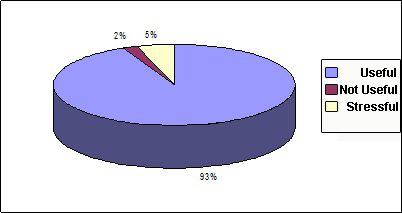
Shows better counsellor in %.
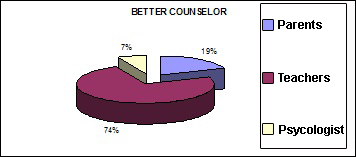
Shows how does counselling help in % of students.
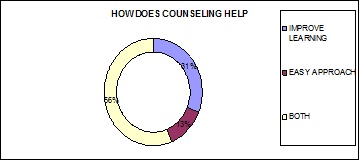
Did you improve after counselling in % of students.
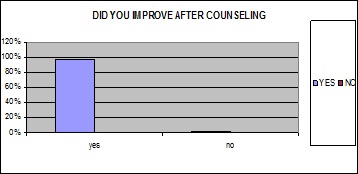
Correlation between difference in average marks between 1st half and 2nd half of the academic year with number of sessions.
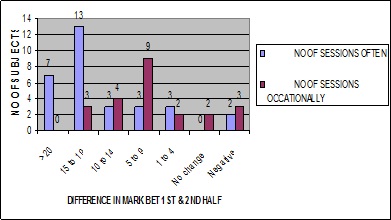
[Table/Fig-5] There was no marked improvement among 31% of them and there was no change in 4% of the students. The second part of the study showed that the number of sessions correlated positively with the academic performance.
DISCUSSION
One study explored the impact of counselling on the academic progress and the retention by using both objective and self–reported measures. A comparison was made between the counselling of the clients and the general student body. It indicated that the counselled students showed a superior retention as compared to their peers [3]. Reviews which were done on the school counselling also proved that it had a positive effect on the children [4–7]. There are also studies which have proved that those who attended the counselling showed improvement in their grades as compared to those who did not [8]. This study, like the other studies, proved that 93% of the students had found that the counselling sessions useful. This study also proved that more students (43%) showed improvement in the academic performance by 15-25% and that 13% of the students showed improvement by 10-15%. Thus, this study proved that more than 50% (43+13%) of the students had shown good improvement after the counselling. This study also proved that those who attended more number of sessions showed better response than those who attended less number of sessions. Finally, we can conclude from this study, that counselling is very effective in improving the students’ performance as well as their confidence.
CONCLUSION
This study showed that the counselling service in colleges is effective in easing the students’ personal difficulties. The constructive support which was received from individual counselling seemed to have a positive influence on the academic performance and the number of sessions correlated positively with the academic performance.
[1]. Donghyck Lee, Elizabeth A Oleon, Ben Locke, Micheleon Sandra Testa, Odes Eleonara, The effects of college counselling services on academic performances and retentionJournal of College Student Development 2009 May/June 50(3):305-19. [Google Scholar]
[2]. Beck Missing homeAnxiety, stress and coping 2003 June 16(2):155-66. [Google Scholar]
[3]. Turner, Andrew L, Berry, Thomas R, Counseling center contributions to student retention and graduation. A Longitudinal assessmentJournal of College Student Development 2000 Nov-Dec 41(6):627-36. [Google Scholar]
[4]. Borders LD, Drury SM, Comprehensive school counseling programs: A review for policymakers and practitionersJournal of Counselling and Development 1992 70:487-98. [Google Scholar]
[5]. Gerler ER, Elementary school counseling research and the classroom learning environmentElementary School Guindance and Counseling 1985 20:39-48. [Google Scholar]
[6]. St. Clair KL, Middle school counseling research: A resource for school counselorsElementary School Guidance and Counseling 1989 23:219-26. [Google Scholar]
[7]. Whitson SC, Sexton TL, A review of school counseling outcome research: implications for practiceJournal of Counseling and Development 1998 76:412 [Google Scholar]
[8]. Spielberger CD, Weitz H, Improving the academic performance of anxious college freshmen: A group counselling approach to the prevention of underachievementPhysiological Monographs: General and Applied 1964 78(13):1-20. [Google Scholar]